Horror Stories Read online
Page 6
Just as I had known before they showed it to me that Charlestown was surrounded by big trees and had a great pond beside it, so I knew, and in as inexplicable a way, that with these two fear lived. It looked at me out of their eyes. And I knew, too, that this fear was not her fear. I had not been two days in the place before I found that I was beginning to be fond of them both. They were so kind, so gentle, so ordinary, so homely – the kind of people who ought not to have known the name of fear – the kind of people to whom all honest, simple joys should have come by right, and no sorrows but such as come to us all, the death of old friends, and the slow changes of advancing years.
They seemed to belong to the land – to the downs, and the copses, and the old pastures, and the lessening corn-fields. I found myself wishing that I, too, belonged to these, that I had been born a farmer’s daughter. All the stress and struggle of cram and exam, of school, and college, and hospital, seemed so loud and futile, compared with these open secrets of the down life. And I felt this the more, as more and more I felt that I must leave it all – that there was, honestly, no work for me here such as for good or ill I had been trained to do.
‘I ought not to stay,’ I said to her one afternoon, as we stood at the open door. It was February now, and the snowdrops were thick in tufts beside the flagged path. ‘You are quite well.’
‘I am,’ she said.
‘You are quite well, both of you,’ I said. ‘I oughtn’t to be taking your money and doing nothing for it.’
‘You’re doing everything,’ she said; ‘you don’t know how much you’re doing.’
‘We had a daughter of our own once,’ she added vaguely, and then, after a very long pause, she said very quietly and distinctly: ‘He has never been the same since.’
‘How not the same?’ I asked, turning my face up to the thin February sunshine.
She tapped her wrinkled, yellow-grey forehead, as country people do. ‘Not right here,’ she said.
‘How?’ I asked. ‘Dear Mrs Eldridge, tell me; perhaps I could help somehow.’
Her voice was so sane, so sweet. It had come to this with me, that I did not know which of those two was the one who needed my help.
‘He sees things that no-one else sees, and hears things no-one else hears, and smells things that you can’t smell if you’re standing there beside him.’
I remembered with a sudden smile his words to me on the evening of my arrival: ‘She can’t see, or hear, or smell.’
And once more I wondered to which of the two I owed my service.
‘Have you any idea why?’ I asked. She caught at my arm.
‘It was after our Bessie died,’ she said – ‘the very day she was buried. The motor that killed her – they said it was an accident – it was on the Brighton Road. It was a violet colour. They go into mourning for Queens with violet, don’t they?’ she added; ‘and my Bessie, she was a Queen. So the motor was violet. That was all right, wasn’t it?’
I told myself now that I saw that the woman was not normal, and I saw why. It was grief that had turned her brain. There must have been some change in my look, though I ought to have known better, for she said suddenly, ‘No. I’ll not tell you any more.’
And then he came out. He never left me alone with her for very long. Nor did she ever leave him for very long alone with me.
I did not intend to spy upon them, though I am not sure that my position as nurse to one mentally afflicted would not have justified such spying. But I did not spy. It was chance. I had been to the village to get some blue sewing silk for a blouse I was making, and there was a royal sunset which tempted me to prolong my walk. That was how I found myself on the high downs where they slope to the broken edge of England – the sheer, white cliffs against which the English Channel beats for ever. The furze was in flower, and the skylarks were singing, and my thoughts were with my own life, my own hopes and dreams. So I found that I had struck a road, without knowing when I had struck it. I followed it towards the sea, and quite soon it ceased to be a road, and merged in the pathless turf as a stream sometimes disappears in sand. There was nothing but turf and furze bushes, the song of the skylarks, and beyond the slope that ended at the cliff’s edge, the booming of the sea. I turned back, following the road, which defined itself again a few yards back, and presently sank to a lane, deep-banked and bordered with brown hedge stuff. It was there that I came upon them in the dusk. And I heard their voices before I saw them, and before it was possible for them to see me. It was her voice that I heard first.
‘No, no, no, no, no,’ it said.
‘I tell you yes,’ that was his voice; ‘there – can’t you hear it, that panting sound – right away – away? It must be at the very edge of the cliff.’
‘There’s nothing, dearie,’ she said, ‘indeed there’s nothing.’
‘You’re deaf – and blind – stand back I tell you, it’s close upon us.’
I came round the corner of the lane then, and as I came, I saw him catch her arm and throw her against the hedge – violently, as though the danger he feared were indeed close upon them. I stopped behind the turn of the hedge and stepped back. They had not seen me. Her eyes were on his face, and they held a world of pity, love, agony – his face was set in a mask of terror, and his eyes moved quickly as though they followed down the lane the swift passage of Something – something that neither she nor I could see. Next moment he was cowering, pressing his body into the hedge – his face hidden in his hands, and his whole body trembling so that I could see it, even from where I was a dozen yards away, through the light screen of the over-grown hedge.
‘And the smell of it!’ – he said, ‘do you mean to tell me you can’t smell it?’
She had her arms round him.
‘Come home, dearie,’ she said. ‘Come home! It’s all your fancy – come home with your old wife that loves you.’
They went home.
Next day I asked her to come to my room to look at the new blue blouse. When I had shown it to her I told her what I had seen and heard yesterday in the lane.
‘And now I know,’ I said, ‘which of you it is that wants care.’
To my amazement she said very eagerly, ‘Which?’
‘Why, he – of course’ – I told her, ‘there was nothing there.’
She sat down in the chintz-covered armchair by the window, and broke into wild weeping. I stood by her and soothed her as well as I could.
‘It’s a comfort to know,’ she said at last, ‘I haven’t known what to believe. Many a time, lately, I’ve wondered whether after all it could be me that was mad, like he said. And there was nothing there? There always was nothing there – and it’s on him the judgment, not on me. On him. Well, that’s something to be thankful for.’
So her tears, I told myself, had been more of relief at her own escape. I looked at her with distaste, and forgot that I had been fond of her. So that her next words cut me like little knives.
‘It’s bad enough for him as it is,’ she said – ‘but it’s nothing to what it would be for him, if I was really to go off my head and him left to think he’d brought it on me. You see, now I can look after him the same as I’ve always done. It’s only once in the day it comes over him. He couldn’t bear it, if it was all the time – like it’ll be for me now. It’s much better it should be him – I’m better able to bear it than he is.’
I kissed her then and put my arms round her, and said, ‘Tell me what it is that frightens him so – and it’s every day, you say?’
‘Yes – ever since. I’ll tell you. It’s a sort of comfort to speak out. It was a violet-coloured car that killed our Bessie. You know our girl that I’ve told you about. And it’s a violet-coloured car that he thinks he sees – every day up there in the lane. And he says he hears it, and that he smells the smell of the machinery – the stuff they put in it – you know.’
‘Petrol?’
‘Yes, and you can see he hears it, and you can see he sees it. It haunts him, as if it w
as a ghost. You see, it was he that picked her up after the violet car went over her. It was that that turned him. I only saw her as he carried her in, in his arms – and then he’d covered her face. But he saw her just as they’d left her, lying in the dust … you could see the place on the road where it happened for days and days.’
‘Didn’t they come back?’
‘Oh yes … they came back. But Bessie didn’t come back. But there was a judgment on them. The very night of the funeral, that violet car went over the cliff – dashed to pieces – every soul in it. That was the man’s widow that drove you home the first night.’
‘I wonder she uses a car after that,’ I said – I wanted something commonplace to say.
‘Oh,’ said Mrs Eldridge, ‘it’s all what you’re used to. We don’t stop walking because our girl was killed on the road. Motoring comes as natural to them as walking to us. There’s my old man calling – poor old dear. He wants me to go out with him.’
She went, all in a hurry, and in her hurry slipped on the stairs and twisted her ankle. It all happened in a minute and it was a bad sprain.
When I had bound it up, and she was on the sofa, she looked at him, standing as if he were undecided, staring out of the window, with his cap in his hand. And she looked at me.
‘Mr Eldridge mustn’t miss his walk,’ she said. ‘You go with him, my dear. A breath of air will do you good.’
So I went, understanding as well as though he had told me, that he did not want me with him, and that he was afraid to go alone, and that he yet had to go.
We went up the lane in silence. At that corner he stopped suddenly, caught my arm, and dragged me back. His eyes followed something that I could not see. Then he exhaled a held breath, and said, ‘I thought I heard a motor coming.’ He had found it hard to control his terror, and I saw beads of sweat on his forehead and temples. Then we went back to the house.
The sprain was a bad one. Mrs Eldridge had to rest, and again next day it was I who went with him to the corner of the lane.
This time he could not, or did not try to, conceal what he felt. ‘There – listen!’ he said. ‘Surely you can hear it?’
I heard nothing.
‘Stand back,’ he cried shrilly, suddenly, and we stood back close against the hedge.
Again the eyes followed something invisible to me, and again the held breath exhaled.
‘It will kill me one of these days,’ he said, ‘and I don’t know that I care how soon – if it wasn’t for her.’
‘Tell me,’ I said, full of that importance, that conscious competence, that one feels in the presence of other people’s troubles. He looked at me.
‘I will tell you, by God,’ he said. ‘I couldn’t tell her. Young lady, I’ve gone so far as wishing myself a Roman, for the sake of a priest to tell it to. But I can tell you, without losing my soul more than it’s lost already. Did you ever hear tell of a violet car that got smashed up – went over the cliff?’
‘Yes,’ I said. ‘Yes.’
‘The man that killed my girl was new to the place. And he hadn’t any eyes – or ears – or he’d have known me, seeing we’d been face to face at the inquest. And you’d have thought he’d have stayed at home that one day, with the blinds drawn down. But not he. He was swirling and swivelling all about the country in his cursed violet car, the very time we were burying her. And at dusk – there was a mist coming up – he comes up behind me in this very lane, and I stood back, and he pulls up, and he calls out, with his damned lights full in my face: “Can you tell me the way to Hexham, my man?” says he.
‘I’d have liked to show him the way to hell. And that was the way for me, not him. I don’t know how I came to do it. I didn’t mean to do it. I didn’t think I was going to – and before I knew anything, I’d said it. “Straight ahead,” I said; “keep straight ahead.” Then the motor-thing panted, chuckled, and he was off. I ran after him to try to stop him – but what’s the use of running after these motor-devils? And he kept straight on. And every day since then, every dear day, the car comes by, the violet car that nobody can see but me – and it keeps straight on.’
‘You ought to go away,’ I said, speaking as I had been trained to speak. ‘You fancy these things. You probably fancied the whole thing. I don’t suppose you ever did tell the violet car to go straight ahead. I expect it was all imagination, and the shock of your poor daughter’s death. You ought to go right away.’
‘I can’t,’ he said earnestly. ‘If I did, someone else would see the car. You see, somebody has to see it every day as long as I live. If it wasn’t me, it would be someone else. And I’m the only person who deserves to see it. I wouldn’t like anyone else to see it – it’s too horrible. It’s much more horrible than you think,’ he added slowly.
I asked him, walking beside him down the quiet lane, what it was that was so horrible about the violet car. I think I quite expected him to say that it was splashed with his daughter’s blood … What he did say was, ‘It’s too horrible to tell you,’ and he shuddered.
I was young then, and youth always thinks it can move mountains. I persuaded myself that I could cure him of his delusion by attacking – not the main fort – that is always, to begin with, impregnable, but one, so to speak, of the outworks. I set myself to persuade him not to go to that corner in the lane, at that hour in the afternoon.
‘But if I don’t, someone else will see it.’
‘There’ll be nobody there to see it,’ I said briskly.
‘Someone will be there. Mark my words, someone will be there – and then they’ll know.’
‘Then I’ll be the someone,’ I said. ‘Come – you stay at home with your wife, and I’ll go – and if I see it I’ll promise to tell you, and if I don’t – well, then I will be able to go away with a clear conscience.’
‘A clear conscience,’ he repeated.
I argued with him in every moment when it was possible to catch him alone. I put all my will and all my energy into my persuasions. Suddenly, like a door that you’ve been trying to open, and that has resisted every key till the last one, he gave way. Yes – I should go to the lane. And he would not go.
I went.
Being, as I said before, a novice in the writing of stories, I perhaps haven’t made you understand that it was quite hard for me to go – that I felt myself at once a coward and a heroine. This business of an imaginary motor that only one poor old farmer could see, probably appears to you quite commonplace and ordinary. It was not so with me. You see, the idea of this thing had dominated my life for weeks and months, had dominated it even before I knew the nature of the domination. It was this that was the fear that I had known to walk with these two people, the fear that shared their bed and board, that lay down and rose up with them. The old man’s fear of this and his fear of his fear. And the old man was terribly convincing. When one talked with him, it was quite difficult to believe that he was mad, and that there wasn’t, and couldn’t be, a mysteriously horrible motor that was visible to him, and invisible to other people. And when he said that, if he were not in the lane, someone else would see it – it was easy to say ‘Nonsense,’ but to think ‘Nonsense’ was not so easy, and to feel ‘Nonsense’ quite oddly difficult.
I walked up and down the lane in the dusk, wishing not to wonder what might be the hidden horror in the violet car. I would not let blood into my thoughts. I was not going to be fooled by thought transference, or any of those transcendental follies. I was not going to be hypnotised into seeing things.
I walked up the lane – I had promised him to stand near that corner for five minutes, and I stood there in the deepening dusk, looking up towards the downs and the sea. There were pale stars. Everything was very still. Five minutes is a long time. I held my watch in my hand. Four – four and a half – four and a quarter. Five. I turned instantly. And then I saw that he had followed me – he was standing a dozen yards away – and his face was turned from me. It was turned towards a motor car that shot up the lane –
It came very swiftly, and before it came to where he was, I knew that it was very horrible. I crushed myself back into the crackling bare hedge, as I should have done to leave room for the passage of a real car – though I knew that this one was not real. It looked real – but I knew it was not.
As it neared him, he started back, then suddenly he cried out. I heard him. ‘No, no, no, no – no more, no more,’ was what he cried, with that he flung himself down on the road in front of the car, and its great tyres passed over him. Then the car shot past me and I saw what the full horror of it was. There was no blood – that was not the horror. The colour of it was, as she had said, violet.
I got to him and got his head up. He was dead. I was quite calm and collected now, and felt that to be so was extremely creditable to me. I went to a cottage where a labourer was having tea – he got some men and a hurdle.
When I had told his wife, the first intelligible thing she said was: ‘It’s better for him. Whatever he did he’s paid for now –’ So it looks as though she had known – or guessed – more than he thought.
I stayed with her till her death. She did not live long.
You think perhaps that the old man was knocked down and killed by a real motor, which happened to come that way of all ways, at that hour of all hours, and happened to be, of all colours, violet. Well, a real motor leaves its mark on you where it kills you, doesn’t it. But when I lifted up that old man’s head from the road, there was no mark on him, no blood – no broken bones – his hair was not disordered, nor his dress. I tell you there was not even a speck of mud on him, except where he had touched the road in falling. There were no tyre marks in the mud.
The motor car that killed him came and went like a shadow. As he threw himself down, it swerved a little so that both its wheels should go over him.
He died, the doctor said, of heart-failure. I am the only person to know that he was killed by a violet car, which, having killed him, went noiselessly away towards the sea. And that car was empty – there was no-one in it. It was just a violet car that moved along the lanes swiftly and silently, and was empty.

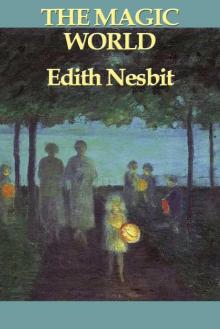 The Magic World
The Magic World In the Dark
In the Dark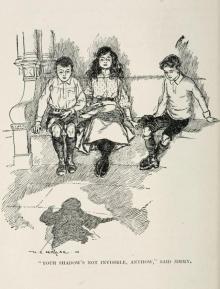 The Enchanted Castle
The Enchanted Castle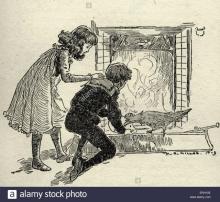 The Phoenix and the Carpet
The Phoenix and the Carpet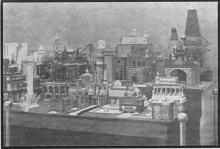 The Magic City
The Magic City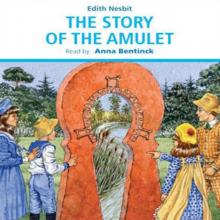 The Story of the Amulet
The Story of the Amulet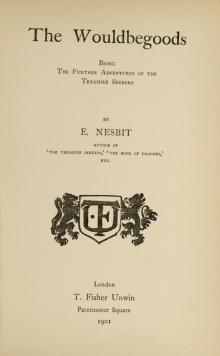 The Wouldbegoods: Being the Further Adventures of the Treasure Seekers
The Wouldbegoods: Being the Further Adventures of the Treasure Seekers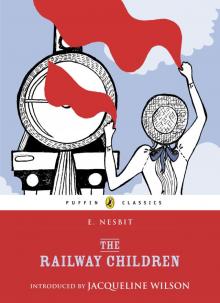 The Railway Children
The Railway Children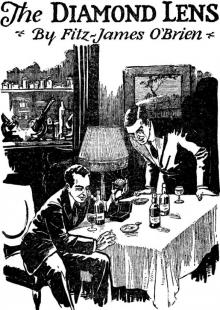 The Diamond Lens
The Diamond Lens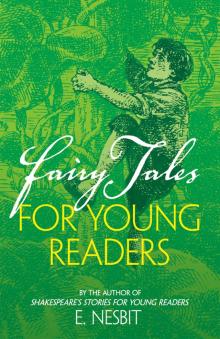 Fairy Tales for Young Readers
Fairy Tales for Young Readers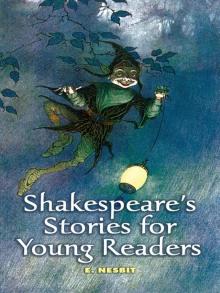 Shakespeare's Stories for Young Readers (Dover Children's Classics)
Shakespeare's Stories for Young Readers (Dover Children's Classics) The Wouldbegoods
The Wouldbegoods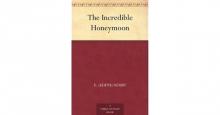 The Incredible Honeymoon
The Incredible Honeymoon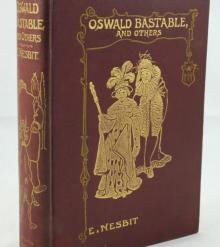 Oswald Bastable and Others
Oswald Bastable and Others Pussy and Doggy Tales
Pussy and Doggy Tales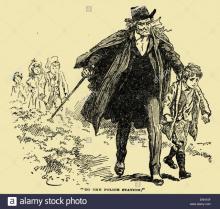 New Treasure Seekers; Or, The Bastable Children in Search of a Fortune
New Treasure Seekers; Or, The Bastable Children in Search of a Fortune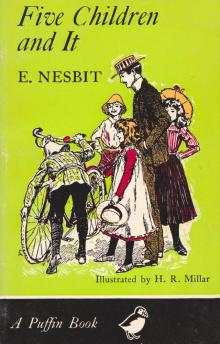 Five Children and It
Five Children and It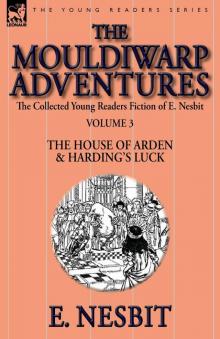 Harding's luck
Harding's luck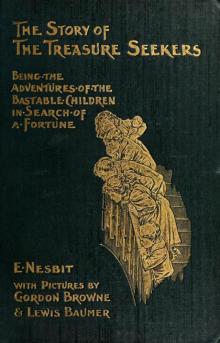 The Story of the Treasure Seekers
The Story of the Treasure Seekers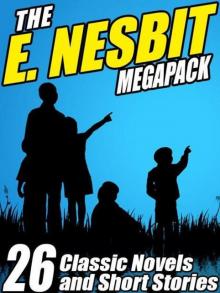 The E. Nesbit Megapack: 26 Classic Novels and Stories
The E. Nesbit Megapack: 26 Classic Novels and Stories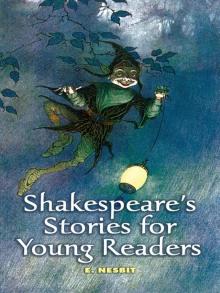 Shakespeare's Stories for Young Readers
Shakespeare's Stories for Young Readers